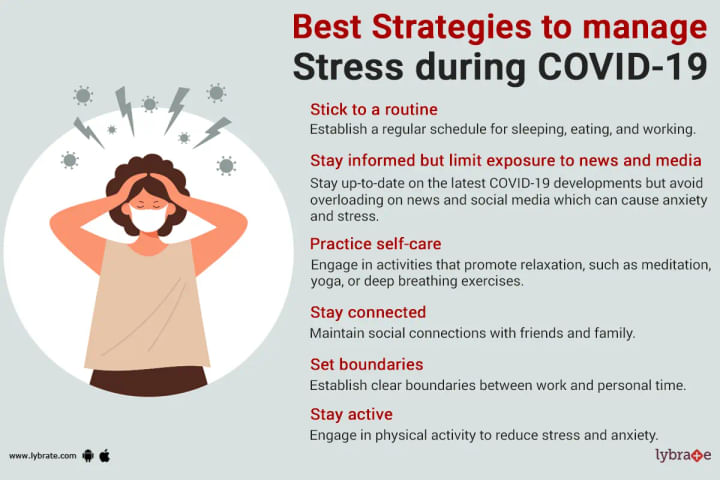Stress management strategies during COVID-19
Individuals and communities all over the world have experienced unprecedented stress and uncertainty as a result of the COVID-19 pandemic. Aside from the physical health risks posed by the virus, the pandemic has had a significant impact on mental health, with many people experiencing increased stress and anxiety.
This article will go over a few stress-reduction techniques that can be used during the COVID-19 pandemic.
Mindfulness and meditation:
Mindfulness and meditation are stress management techniques that can help people focus on the present moment and reduce stress and anxiety. These practices can be done in a variety of ways, such as through guided meditations, deep breathing exercises, or simply paying attention to the present moment. Mindfulness and meditation can also help individuals develop emotional regulation skills, which can be particularly useful during times of stress.
Exercise:
Regular exercise is an effective stress-reduction technique that can help people improve their physical and mental health. Exercise reduces stress and anxiety by releasing endorphins, or 'feel-good' chemicals in the brain. Regular exercise can also help to improve sleep quality and boost self-esteem, both of which can help to reduce stress and anxiety.
Social connections:
Social connections can be an important source of support during times of stress, and the COVID-19 pandemic has made it more difficult for people to connect with others in person. Despite this, it is still important to maintain social connections, whether it be through phone calls, video chats, or online platforms. It's important to talk to your loved ones, friends and family as they can provide you with emotional support and a sense of belonging.
Time management:
The COVID-19 pandemic has led to a lot of uncertainty and change, and this can make it difficult to manage time effectively. However, by setting realistic goals and prioritizing tasks, individuals can reduce stress and anxiety by feeling more in control of their time. It's important to set boundaries, as well, and make sure to make time for yourself, whether it be for self-care or for leisure activities.
Self-care:
Self-care is an important stress management technique that can help individuals maintain their physical and mental well-being during the COVID-19 pandemic. Self-care activities can include anything from taking a relaxing bath, to reading a book, to taking a walk outside.
Professional help:
There are many different types of mental health professionals, including therapists and counselors, who can provide individuals with the tools and support they need to manage stress and anxiety.
To summarise, the COVID-19 pandemic has caused unprecedented stress and uncertainty for individuals and communities worldwide. Stress management techniques can assist individuals in coping with the pandemic's emotional and psychological effects.
Mindfulness and meditation, exercise, social connections, time management, self-care, and professional help are all effective stress management techniques that can be used during the COVID-19 pandemic. It's important to find what works for you and make sure to take care of yourself.



+1.svg)
